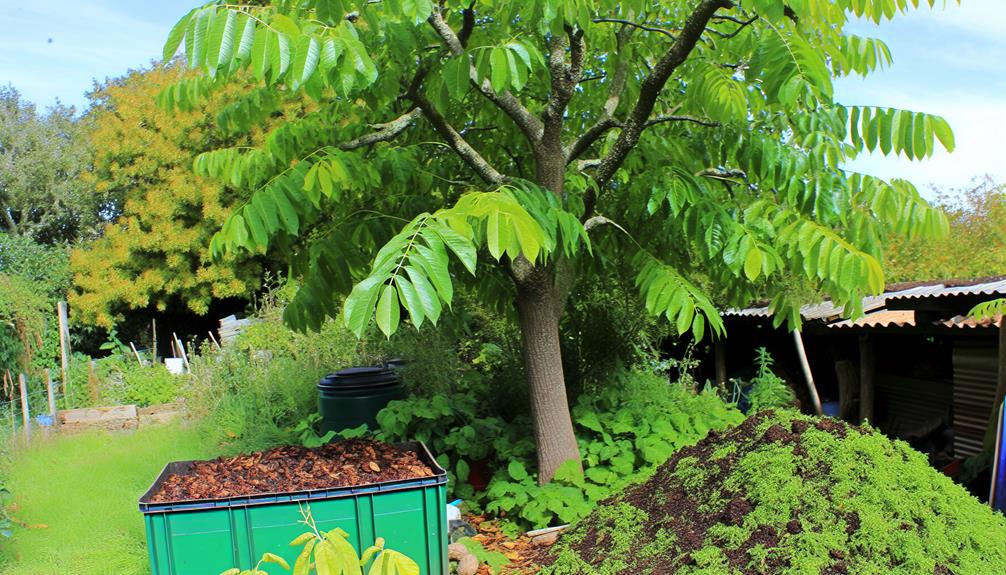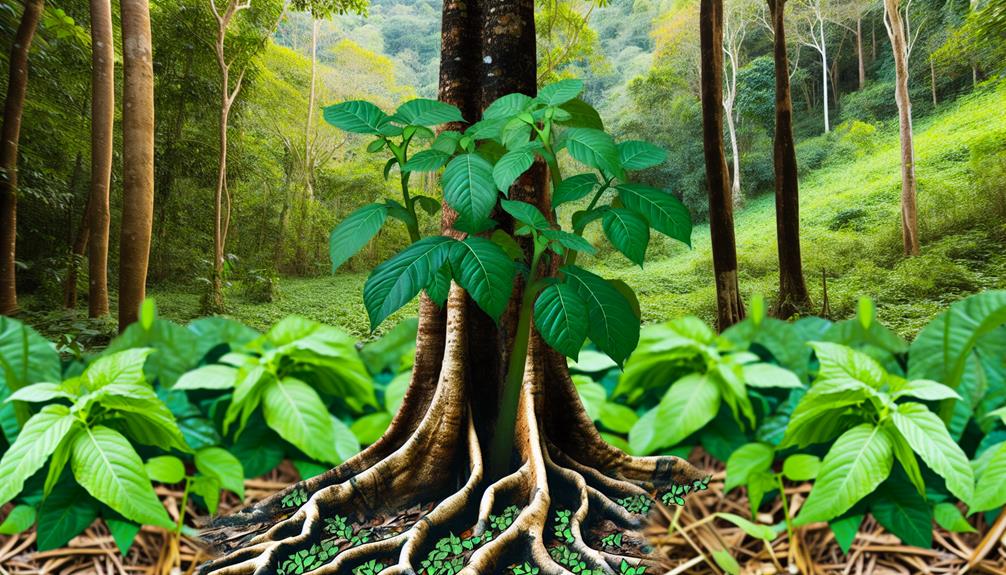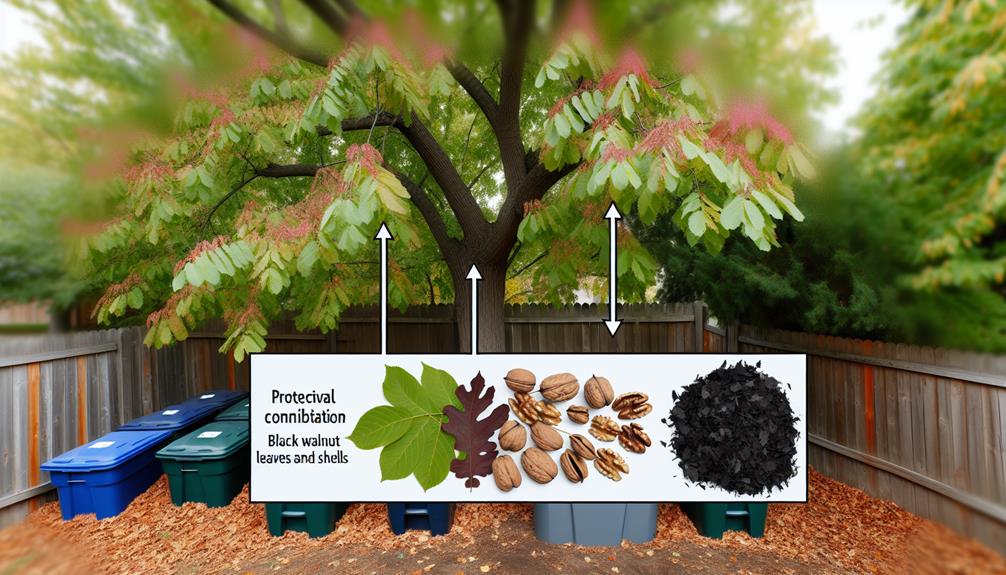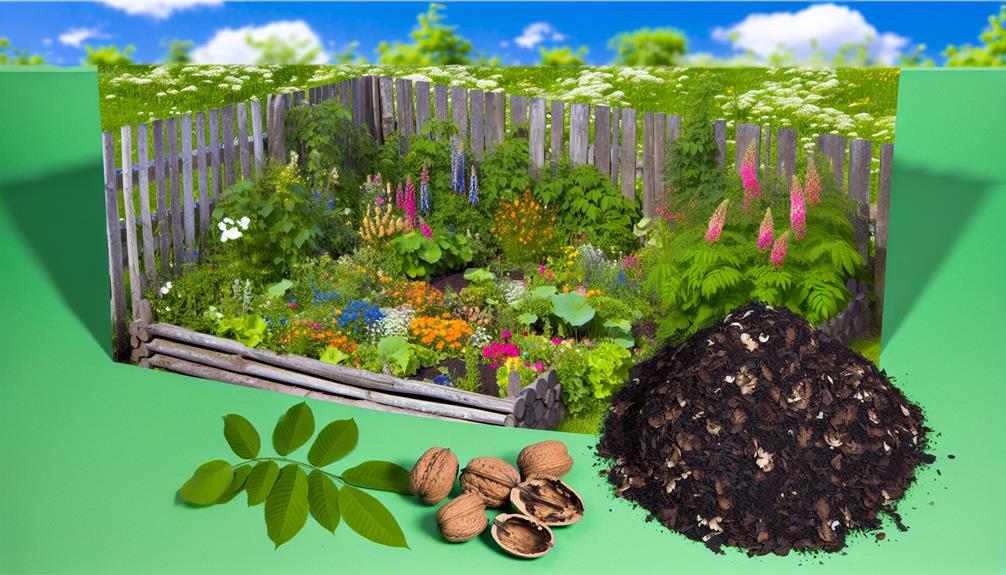

You can compost black walnut tree material safely by managing its natural toxin, juglone. Juglone can harm many plants, so it’s important to take precautions. Hot composting at temperatures above 140°F or using vermiculture can break down juglone effectively. Separate black walnut leaves, bark, and twigs from other compost materials to prevent contamination. Test the compost on a small garden section to make sure it’s safe. Once it’s broken down, however, it offers excellent nutrients for non-sensitive plants. Understanding these methods can help you recycle garden waste sustainably and boost your garden’s health! There’s more to learn about safe uses and methods ahead.

Black walnut trees produce a chemical called juglone, which can be toxic to many plants. This natural compound seeps from the tree’s roots, leaves, and nuts into the soil, potentially affecting the plants around it.
You might notice that certain plants, like tomatoes or azaleas, struggle to grow near black walnut trees. This happens because juglone inhibits their growth or even kills them. Understanding this importance is essential if you’re considering composting black walnut material. You wouldn’t want to harm your garden’s plants unintentionally.
Composting black walnut material may seem challenging at first, but it has several benefits that can enhance your garden’s health. When you compost black walnut leaves and husks properly, you’ll discover they offer unique advantages that can foster a thriving garden environment.
Here’s why you should consider it:
Embrace these benefits to cultivate a lush, vibrant garden!

Before you start composting black walnut material, it’s crucial to understand the precautions necessary to avoid potential garden issues. Black walnut trees produce a chemical called juglone, which can harm many plants.
You should compost black walnut leaves, bark, and twigs separately in a dedicated pile to prevent contamination. Make sure you monitor the composting process closely, allowing ample time for juglone to break down completely.
If you plan to use this compost, test it on a small section of your garden first to check for any adverse effects. Always wear gloves and avoid inhaling any dust from the compost to protect your health.
Although traditional composting methods are effective, you might find alternative composting techniques more suitable for handling black walnut material safely. These methods can help you manage the toxic juglone compound and guarantee your compost remains beneficial for your garden.
Here are some approaches you can explore:

You can safely use black walnut compost in non-sensitive areas of your garden, such as around ornamental plants and trees. This compost isn’t ideal for all plants due to its juglone content, but by using it wisely, you can enrich your soil without harm. Consider applying it to plants that are resistant to juglone, like tomatoes, peppers, or beans.
Here’s a quick guide to help you decide where to use black walnut compost:
| Safe Uses | Avoid Using |
|---|---|
| Ornamental plants | Vegetables |
| Trees | Fruits |
| Hardy shrubs | Delicate flowers |
| Pathway borders | Root vegetables |
| Non-sensitive perennials | Sensitive annuals |
Composting black walnut trees can be a rewarding and environmentally-friendly way to recycle organic matter. With proper precautions, like separating leaves and bark, you can safely transform toxic materials into nutrient-rich compost.
Alternative methods, such as hot composting, can also help neutralize harmful compounds. By following these guidelines, you’ll not only protect your garden but also contribute to a sustainable ecosystem.
Embrace the challenge and enjoy the benefits of your eco-friendly efforts!
